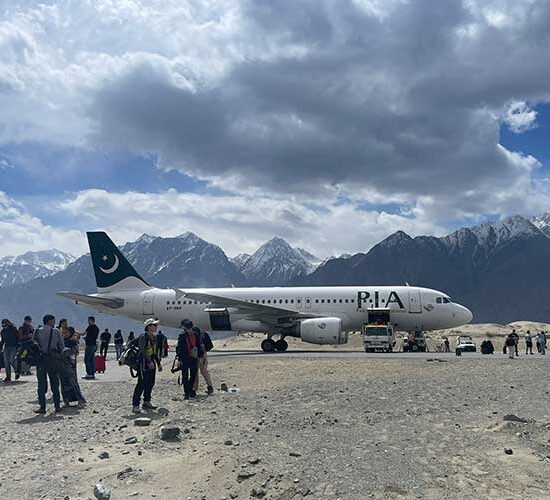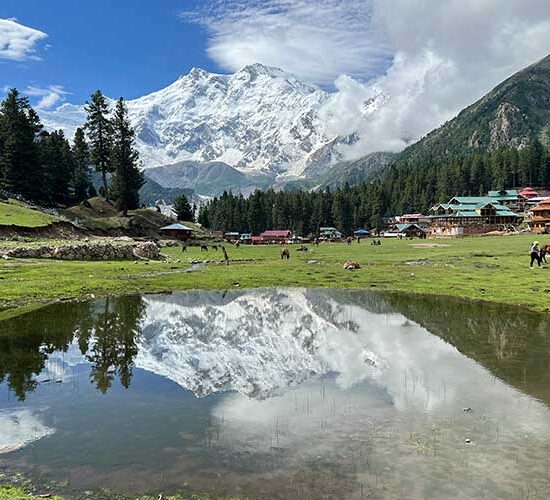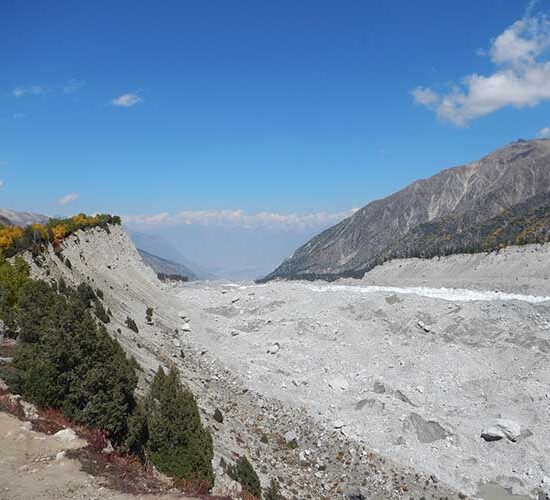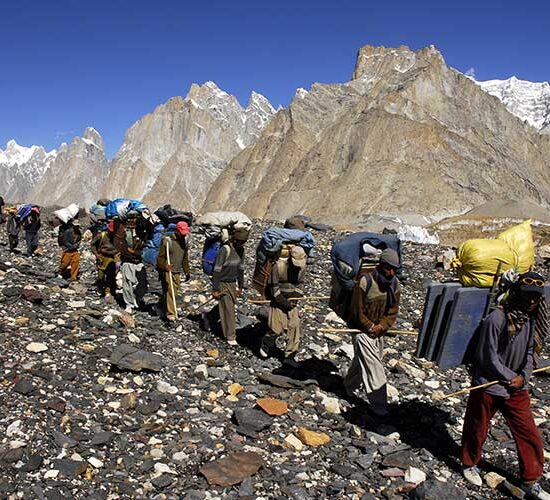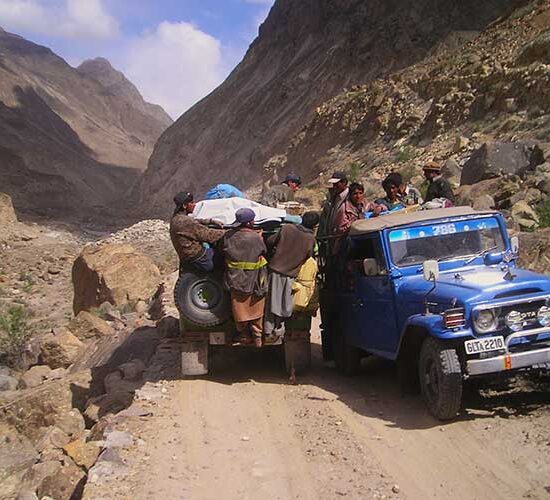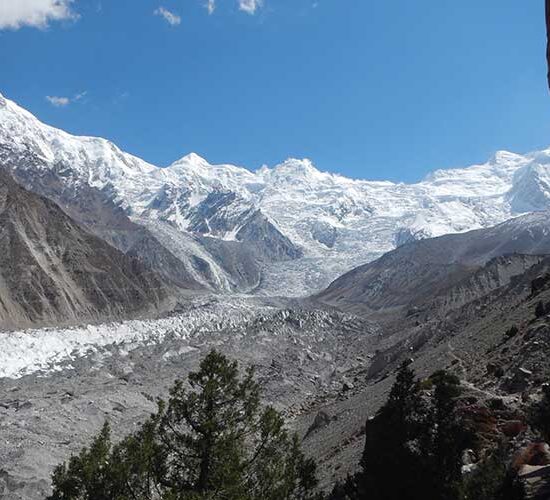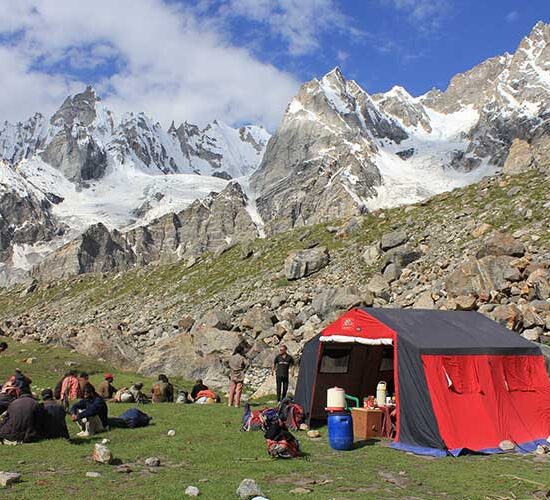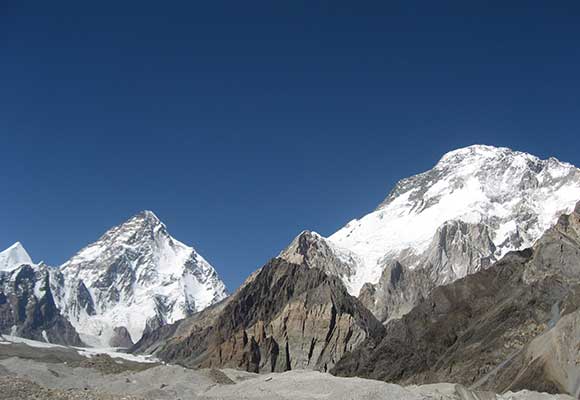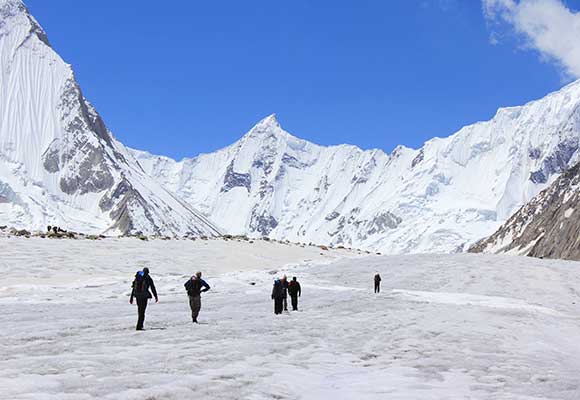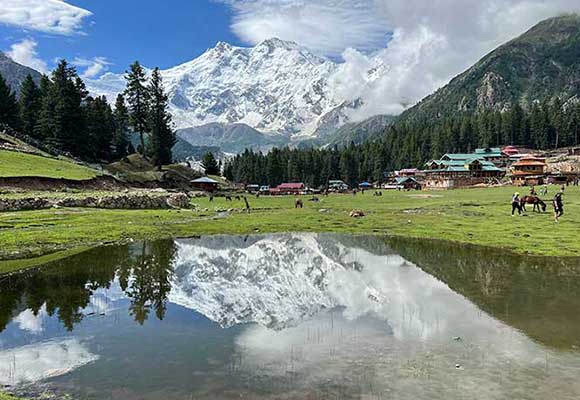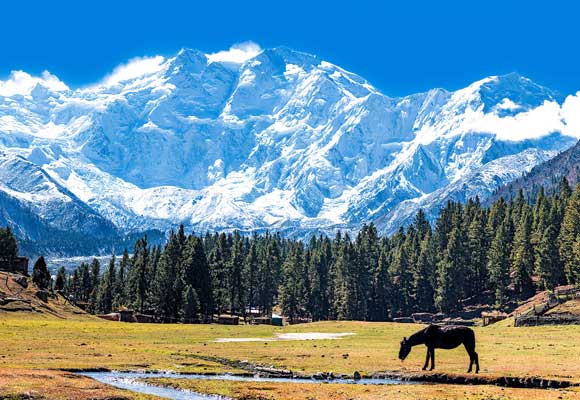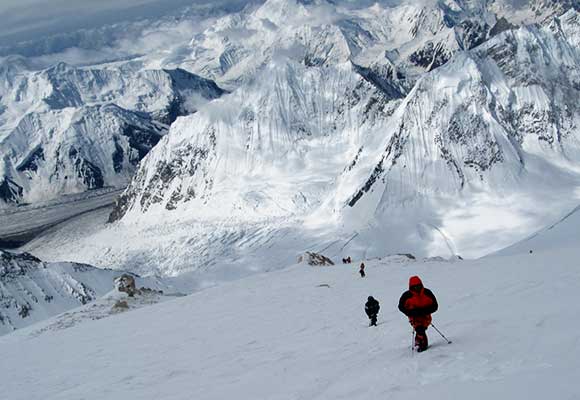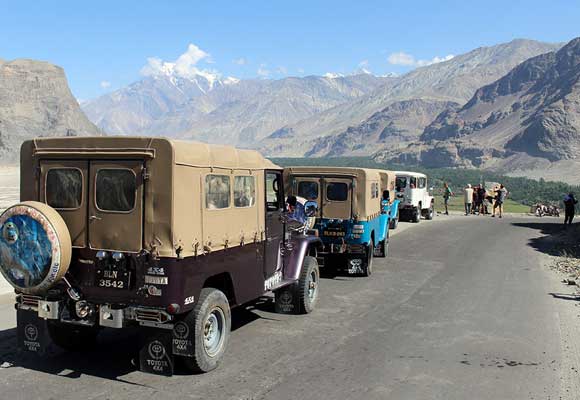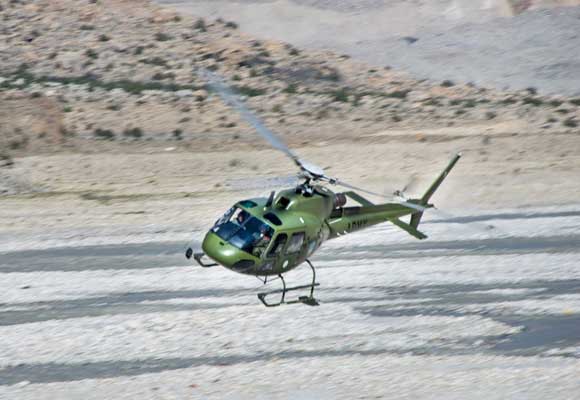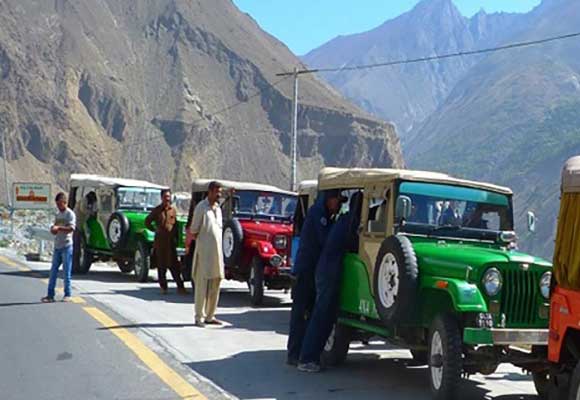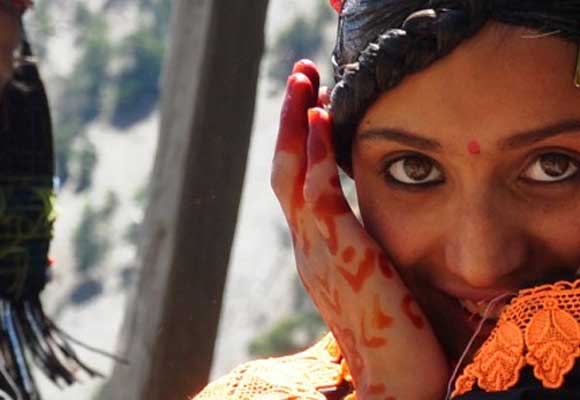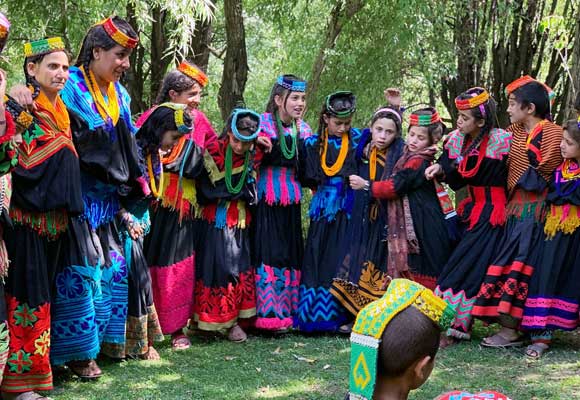Fairy Meadows & Rakaposhi Base Camp Trek
OVERVIEW & ITINERARY
According to seasoned travelers, Rakaposhi and Nanga Parbat are two of the most beautiful mountains in the world. Similarly, Hunza and Fairy Meadows have no match in their scenic beauty. Both places and mountains have been selected for this great tour so that you can maximally enjoy the captivating beauty of the lofty mountains, green valleys and alpine meadows which the north of Pakistan have to offer. We will also not forget to have some interesting cultural heritage visits by stopping at ancient Buddhist rock carving sites, visiting the Baltit & Altit Fort, walking through the old Silk Road settlement of Ganish village and by going to the Kargah Buddha near Gilgit.
ITINERARY
Arrive in Islamabad. Meet guide & transfer to the hotel. You can choose to take rest to recover from the long flight or go for a half or full day sightseeing tour.
Sightseeing tour in Islamabad will consist of a selection of some of the following sites (depending on available time & your interests): the Faisal Mosque, the Government buildings on Constitution Avenue, the Pakistan Monument, the Lok Virsa heritage museum, Saidpur village, Daman-e-Koh to look out over the twin cities.
After breakfast we either fly to Gilgit and then drive to Chilas or (if the flight got cancelled or if preferred) drive towards Chilas by air conditioned bus / car over the famous Karakoram Highway (10 – 12 hrs - 480 Km) or via Naran / the Kaghan valley over the Babusar Pass (9-11 hrs – 400km). Chilas is a small bazaar town from where we can glimpse petroglyphs dating to the 1st century BC. Overnight at hotel in Chilas.
From Chilas we will go to Raikot Bridge where we transfer into 4X4 jeeps before heading to Tatto village. After arriving in Tatto village it is going to be a 3 hour trek to Fairy Meadows. Overnight stay in huts.
Full rest day at Fairy Meadows or make a day hike to visit to Beyal, Raikot face base camp of Nanga Parbat, overnight stay in huts.
We say goodbye to the beautiful Fairy Meadows and trek back down to Tatto Village from where we will take the 4x4 jeeps to Raikot Bridge. Transfer to A/C bus or car and proceed to Gilgit, here we can go for sightseeing in and around Gilgit, including the bazaar as well as the Kargah Buddha outside of town. Overnight at hotel in Gilgit.
From Gilgit we start early and head further north making a short stop at the the continental collision point at Chalt as well as at Rakaposhi viewpoint, from where we can have a close and wonderful view of Rakaposhi Peak (7788m) before reaching our destination: Minapin. Here we will make a day hike: walking along the Minapin River then going through a juniper forest following a trail that leads to the base of a waterfall at Bang-i-Das, in the end we reach the green grasslands of Hapakun. Here you will have northern views of Hachindar and Maiun Peaks, if we’re lucky Ibex can be seen on the cliffs above the Minapin glacier. Total 3 – 4 hours of trekking going up and 2 going down. Dinner and overnight in a guesthouse in Minapin.
It will only be a short drive to the capital of Hunza, Karimabad - we will go for sightseeing of Karimabad Bazaar and the Baltit Fort. At
the end of the afternoon we drive to Duikar to enjoy the beautiful sunset at the viewpoint above the Eagle’s Nest hotel. Overnight in a hotel in Karimabad, Altit or Duikar.
Visit to the Baltit Fort is of immense interest. For many years the fort served as an administrative headquarter and home to the former Mirs (rulers) of Hunza. The porters who accompanied the Balti bride for the then Mir of Hunza built it more than 700 years ago. The style of construction originates from Ladakh. A maze of rooms serving as living and administrative offices were added periodically designed with indigenous woodwork. It is strategically located on a prospect point, which gives it an immense overview of Hunza and neighboring valleys. Currently it serves as a Fort Museum with a good collection of exhibit of artifacts and musical instruments from Hunza. The fort is now administered by the Aga Khan Foundation Cultural Board, which undertook the reconstruction and re-establishment to its original grandeur
Very few places in the world compare with this small mountainous region, which was a semi-autonomous state until very recently but is now fully unified with Pakistan, the ruling dynasty of Hunza having lasted for over 600 years. The scenic beauty of this area, with its greenery and snow-capped mountains, makes it a true paradise. During the summer there is an abundance of apricots, peaches, pears and grapes. Hunza is probably most famous for the longevity of its people, due to their simplicity and natural diet, along with the unpolluted mountain air. Tibetan traders referred to the beauty of this humble paradise as "Shangri-La".
In the morning we can make a walk along the water channels to see the local life and meet some of the residents. After lunch we will visit Ganish village and the Altit Fort. Dinner & overnight at a hotel in Karimabad, Altit or Duikar.
Ganish Village is a small and ancient village on the KKH in central Hunza. Originally a single compact cluster of houses, greater Ganish now comprises about seven clusters of dwellings. Ganish was recognized for its strategic location on the breech of the Silk Road leading out of the Karakorum into Uighur China (Xinjiang). The historic village was restored by the Aga Khan Cultural Service focus on three physical components, Pharee, a historic water pond, Sawab Ha, (the house of benediction) two storied, and two roomed with carved wooden elements, Jataq open space used for the common and shared activities of the community and the Mosques The ancient house in Hunza has received the UNESCOs Heritage Award for 2009. The House, a 400-year-old architectural masterpiece, formerly used by envoy of Mir of Hunza.
Today we will make a nice trip to the Nagar Valley and Hoper glacier, a very beautiful area which also gives you the opportunity to meet the people of Nagar and to see everything from the other side (as Nagar Valley is opposite of Hunza Valley). You can also make a walk at Hoper glacier towards the actual glacier (1 hour each way). From there we drive onward to Gulmit / Passu (Upper Hunza) via the newly constructed road, making a stop at the sacred (carved) rocks at Haldeikish and driving past the Attabad Lake (which for some years you had to cross by boat as it was created by a massive landslide in 2010 which swept away an entire village as well as the main road). Dinner & overnight in Gulmit or Passu.
Nagar was formerly a princely state in the northernmost part of the Northern Areas of Pakistan, which existed until 1974. It was an independent principality for 1200 years, the British gained control of Nagar during a battle at place of Nilt (Jangir-e-Laye) between 1889 and 1892. Nagarkutch fought bravely but was defeated due to lack of weapons. The Tham (Chief) of that time, Azur Khan, was sent in exile to Kashmir. Hunza was previously under the domination of Nagar and collectively called Buroshall and their capital was Capal Dongs. But after the reign of the Miyor Khan his sons divided Buroshall into Nagar and Hunza and declared the river as the border: Muglot became the king of Nagar and Kirkis became the king of Hunza.
Sacred Rocks: Called “the guest book of the Silk Route” by professor A H Dani. Pakistan’s famous archaeologist, the rocks record 2,000 years of travels along the road to and from China. The inscriptions are in Kharoshthi, Barhmi, Gupta, Sogdian and Tibetan. The rock carving and inscriptions around Ganish village give proof of the Buddhist influence in the area. The inscriptions are in four different scripts and the carvings are of human and animals figures.
Gulmit, halfway: 135 km both from Gilgit and Khunjerab Pass, 35 kilometers from Hunza. Gulmit is Gojal's largest settlement and is located on the main KKH at an altitude of about 8871 feet (2,703 meters). It served as the summer capital of the former Hunza state. A very picturesque place, there are many fine walks along irrigation channels in the area. Kamaris is the higher village which offers fine views back to the jagged Passu spires. There is also Andra Fort which is placed on a spectacular mount above the old settlement of Gulmit, the ruins of Andra Fort speak of the strategic defensive outfits of the village. This was basically a collective Fort, built during the late 17th century when Hunza - Nagar wars were common, you can see the archaeological ruins from this most spectacular mount. For tourist it is a breathtaking view from Andra, it will be a 30-minute detour northeast from Kamaris to visit the ruins of the Andra Fort.
In the morning we will visit Passu glacier & Borith Lake, we will have several hiking options in this area, either between the glacier and the lake or starting from Gulmit village to Borith Lake or to Kamaris village and the Andra Fort. Depending on the available time we will explore Gulmit (the Gulmit museum, Gulmit Old House, Polo grounds) and or Passu or Ghulkin village in the afternoon. Overnight in Gulmit or Passu.
Passu Glacier is white and shining and deeply creased, and looks exactly what you expect a glacier to look like, most other glaciers in the area are covered in rocks and gravel. Above the glacier to the left the jagged line of the Passu and Batura peaks, seven of them over 7,500 meters. Some of these peaks are still unclimbed and are referred to by number, not name, on the map.
Borith Lake one of the highest lakes housed within Pakistan’s mountainous Gilgit Baltistan, is surrounded by a landscape of the world’s greatest mountains, largest glaciers, meadows and wetlands. It is an oval shaped glacial fed lake without an outlet. The expansion and contraction of the nearby Ghulkin and Passu Glaciers causes considerable fluctuation in its water levels. Silence and solitude provide a subtle beauty to the lake. Borith is a paradise for tourists, trekkers and nature lovers with a view of the awesome Ultar peak at 6,735 meters and Borit Sar. The Lake is home to thousands of migratory birds, they come to sojourn here during the spring and autumn migratory season. These birds are not only a beautiful spectacle to observe, but also an educational and recreational resource. The migratory species can be spotted in the area from February to June and September to November. From Upper Borith you can have a spectacular view of Passu glacier and village.
Gulmit Museum: A unique collection of Hunza history is in the local house. The Gulmit Museum, full of interesting traditional ethnic artifacts, wooden bowls, spoon, and farm implements, woolen coats embroidered hats, shawls and even a tapestry of the Last Supper.
Old House: Owned by an old aristocratic family. Old Gulmit house is at the north end of the polo ground. Here you find the Mir of Hunza’s summer residence, which is no longer used. Once the old house were used as the winter residence of the Mir’s of Hunza, today the old house is used as a carpet weaving training centre for women. During the British expedition of Hunza the British officers were given a feast in this house.
We will drive up to Sost and from there to the Khunjerab Top (border of Pakistan and China) for sightseeing. At the end of the afternoon we arrive back in Gilgit for our overnight stay.
The Khunjerab Pass is located in the extreme north-eastern corner of Pakistan. People have used the Khunjerab Pass area for thousands of years. Travelers to and from modern day China crossed one of the four main passes in the Khunjerab region; Kilik, Mintaka, Khunjerab, or Shimshal passes. The Khunjerab Pass at 4,733 meters is the highest border crossing on a paved road in the world. A red sign announces “China drive right” a rival green sing “Pakistan drive left”. The Khunjerab Pass is the continental watershed. Water on the Pakistani side flowing down to the Indian Ocean and on the Chinese side being swallowed up by the Taklimakan means literally, “If you go in you don’t come out”. The scenery is remarkably different on either side of the pass. Sost is the last village in Pakistan on the KKH. Sost Dry Port, Pakistani immigration and customs post. It stands at about 2,700 meters, 206 kilometers from Gilgit. The area around the Khunjerab Pass is a national park where – if you’re lucky – you can see Siberian Ibexes, Marco Polo sheep (ovis ammon poli), a Snow Leopard or other wildlife.
We leave early for the airport to catch our flight* to Islamabad, the afternoon can be spend at leisure or we can go for sightseeing for
example by visiting the Lok Virsa Folk & Heritage museum and or
Saidpur village (if you have not yet visited these sites on day 1) or Taxila. In case our flight got cancelled (or if preferred to travel by road) then we will have a full day of driving from Gilgit to Islamabad.
Depending on your flight departure time we will adjust the program – this would mean either only airport transfer in the morning or we can still have a half or full day of sightseeing in / around Islamabad.
End of our services – we hope you had a great trip!
WHAT'S INCLUDED
- Visa invitation letter & supporting documents.
- Assistance on arrival / departure – incl. airport transfers
- Domestic airfare Islamabad – Gilgit- Islamabad
- Hotel accommodation based on twin room sharing including breakfast & taxes
- Accommodation in huts at fairy meadows
- All meals, lunch & dinners mineral water incl. – other drinks not included
- Highly experienced English speaking guides from arrival till departure
- Air-conditioned private transport incl. driver(s), fuel, toll taxes and parking fees as per the itinerary,
- 4x4 jeeps from Raikot bride to Tatto village & return
- 2 mineral water bottles per person per day
- Tourist site / Museum / National Park entrance fees included as per the itinerary
WHAT'S NOT INCLUDED
- International airfare
- Airport tax
- Excess baggage charges
- if any Extras such as room service, private phone / inter
HIGHLIGHTS
- Gateway to Nanga Parbat: Fairy Meadows offers awe-inspiring views of Nanga Parbat, the world’s ninth-highest mountain. The meadows serve as a starting point for trekkers and climbers aiming to conquer this mighty peak.
- Unspoiled Wilderness: The untouched beauty of Fairy Meadows is a paradise for nature enthusiasts. Lush green meadows, vibrant wildflowers, and a serene atmosphere create an enchanting setting.
- Stargazing: Due to its remote location and minimal light pollution, Fairy Meadows is an excellent spot for stargazing. On clear nights, the sky comes alive with countless stars and celestial wonders.
- Rakaposhi Trek:
- Majestic Scenery: The Rakaposhi trek presents panoramic vistas of Rakaposhi, a stunning mountain in the Karakoram Range. The trek route is adorned with captivating landscapes, including glaciers, valleys, and alpine scenery.
- Moderate Challenge: The trek offers a moderate level of difficulty, making it accessible to a wide range of trekkers. It’s an opportunity to challenge yourself while still enjoying the journey.
- Cultural Interaction: Along the way, you may encounter local communities, providing insights into their way of life, traditions, and warm hospitality.
- Hunza Valley:
- Spectacular Panorama: Hunza Valley offers breathtaking views of towering peaks, including Rakaposhi and Ultar Sar. The valley’s beauty is complemented by terraced fields, fruit orchards, and the Hunza River.
- Historical Gems: Discover historical forts, such as Baltit Fort and Altit Fort, which stand as witnesses to the region’s rich history. These architectural marvels provide insights into the past.
- Cultural Immersion: Engage with the hospitable locals, learn about their traditions, and explore local markets for handicrafts, gemstones, and traditional cuisine.
DATES & PRICES
Start Date |
End Date |
Price |
Deposit |
Status |
|
|---|---|---|---|---|---|
15 October 2023 |
28 October 2023 |
USD $1900 |
USD $300 |
Available |
|
04 November 2023 |
17 November 2023 |
USD $1900 |
USD $300 |
Available |
|
28 November 2023 |
11 December 2023 |
USD $1900 |
USD $300 |
Available |
|
15 January 2024 |
28 January 2024 |
USD $1900 |
USD $300 |
Available |
|
03 February 2024 |
16 February 2024 |
USD $1900 |
USD $300 |
Available |
|
24 February 2024 |
08 March 2024 |
USD $1900 |
USD $300 |
Available |
|
10 March 2024 |
23 March 2024 |
USD $1900 |
USD $300 |
Available |
|
06 April 2024 |
19 April 2024 |
USD $1900 |
USD $300 |
Available |
|
11 May 2024 |
24 May 2024 |
USD $1900 |
USD $300 |
Available |
|
08 June 2024 |
21 June 2024 |
USD $1900 |
USD $300 |
Available |
|
06 July 2024 |
19 July 2024 |
USD $1900 |
USD $300 |
Available |
|
03 August 2024 |
16 August 2024 |
USD $1900 |
USD $300 |
Available |
|
07 September 2024 |
20 September 2024 |
USD $1900 |
USD $300 |
Available |
|
09 October 2024 |
22 October 2024 |
USD $1900 |
USD $300 |
Available |
|
04 November 2024 |
17 November 2024 |
USD $1900 |
USD $300 |
Available |
|
07 December 2024 |
20 December 2024 |
USD $1900 |
USD $300 |
Available |
ROUTE MAP
According to seasoned travelers, Rakaposhi and Nanga Parbat are two of the most beautiful mountains in the world. Similarly, Hunza and Fairy Meadows have no match in their scenic beauty. Both places and mountains have been selected for this great tour so that you can maximally enjoy the captivating beauty of the lofty mountains, green valleys and alpine meadows which the north of Pakistan have to offer. We will also not forget to have some interesting cultural heritage visits by stopping at ancient Buddhist rock carving sites, visiting the Baltit & Altit Fort, walking through the old Silk Road settlement of Ganish village and by going to the Kargah Buddha near Gilgit.
gallery
Frequently Asked Questions
What will the food be like on the trek?
Breakfast: Typically includes an omelet / fried / boiled eggs, fried Pakistani bread (paratha), chappati, toast, pancakes, porridge, cereal, jam, Nutella, honey, marmalade, cheese etc + green tea / coffee / milk tea.
Lunch: unlike other trekking agencies we do not provide packed lunch instead we will have fresh lunch which includes soup, tuna fish, boiled pottatos, eggs, assorted cookies, bread, cheese, dried fruits & nuts, green tea / coffee / juice
Dinner: we start each dinner with a nice warm soup, after that there will be variation of dishes which changes each day. different vegetable dishes, varies types of meat (chicken, beef or mutton) accompanied by rice, noodles, pasta, lentils, potatoes, French fries and or chappati bread. We of course won’t forget dessert, there will be (fresh) fruit and or a type of pudding at every dinner.
Snacks: between lunch and dinner there will be a daily variation of cookies, pakora, popcorn etc. and hot beverages
Note: we will also take into account your specific dietary requirements, for example vegetarian / vegan / lactose intolerant – please don’t hesitate to contact us about the possibilities.
Will we fly to the mountains from Islamabad?
This will depend on your specific itinerary and your own preferences, where possible. For the standard K2 and K2 Gondogoro La and Snow Lake treks we normally schedule the flight on day 2 of your itinerary where we will fly from Islamabad to Skardu. This is a very scenic flight, if the weather is clear you will be able to get amazing mountain views including the 9th highest mountain in the world, Nanga Parbat. When the weather is bad the flight to Skardu might get cancelled, if this happens we will drive in 2 days from Islamabad to Skardu with an overnight stay halfway. There will always be a contingency day in your itinerary to cover for this delay.
What is the luggage allowance on the trek?
Each trekking member has a 15 kg baggage allowance. This is for your main luggage that will be carried to each camp each day of the trek. You yourself are only required to carry a small daypack while trekking – here you can put anything you might need during the day like water, energybars, sunglasses, suncream, clothing etc. If your main backpack/duffle bag weighs more than 15 kg, you will need to pay for the additional weight. Cost for additional weight will be determined on the ground as prices for porters vary by the season. For the K2 treks it is possible to leave excess luggage in our office storage room or at your hotel and pick it up at the end of the trek. Please also kindly note that the baggage allowance on the domestic flights is currently 20 kg check-in and 7 kg hand-carry.
Is there electricity on the trek?
We carry solar panels (no diesel or petrol generators to avoid noise & air pollution), so that each trekking member can charge batteries, power banks, phones, etc while on the trek.
Is it safe to travel in Pakistan?
It is a fair question to ask as we know that most of the news from Pakistan is not so positive, but the image which people have abroad is far from the reality. Although there have been valid reasons for people to consider Pakistan as not very safe, a lot has changed in recent years. The security situation has improved dramatically and the government has been making efforts to promote tourism and facilitate travel. When you visit you will notice immiediately that Pakistanis are very hospitable people, they are eager to get to know you and often will invite you in their home. Pakistan is a huge country, we only offer tours and treks to areas which we deem safe. We currently don’t recommend to travel to the border region with Afghanistan and certain parts of Balochistan but most other places can be visited without any problem. If you prefer to start with the safest region then we would recommend Gilgit-Baltistan in the north, the people here largely depend on tourism for their income and have been warmly welcoming foreign tourist for many years.
Can anyone go on a trek?
Yes and no, it is your own responsibility to select a trek that is suitable for you in terms of you personal fitness level as well as experience – if you book a private trek then you have all the flexibility to customize it and for example add extra days or extra supporting staff if needed. If you book a trek with an open group then we try to only let people join who have a certain experience level. Please don’t hesitate to contact us in case you would like us to help you select the best trek for you.
Do you offer customized tours / treks?
Yes, all the tours and treks that we offer on our website can be completely customized to your own requirements. We are also happy to design a tailor-made tour for you from scratch. Just let us know your preferences, special interests, number of days you have available etc. and we will send you our personalized itinerary suggestions.
Do I need a trekking visa?
For certain types of treks you will require a trekking visa – for example all the K2 treks. If a trekking visa is required then we will inform you accordingly during your booking, there are a lot of treks which are not in a restricted area and therefore you will only need a standard tourist visa.
How long in advance do I need to apply for my visa?
If you have to apply for a standard tourist visa then 1 month in advance should be sufficient – in most cases you will receive your visa within a few days / a week – you should not apply more than 3 months in advance. If you have to apply for a trekking visa then you will need to be prepared for a longer processing time, we recommend to apply 3 to 2 months in advance.
Which gear do I need to bring on my trek?
We will provide you with a suggested packing list after you have booked your tour with us. For most treks it will be standard personal trekking gear like proper hiking boots, optional trekking poles, gaitors, sleeping bag, sleeping pad etc. For certain treks further items are advised – for example for the K2 Gondogoro La and Snow Lake treks you require crampons and a climbing belt set with carabiners and a sling so that you can clip yourself on a rope and you might want to bring a climbing helmet for sections where there can be rockfall.
Can I rent trekking gear from you?
Yes, it is possible to rent certain items from us or we will put you in contact with a trusted local supplier who can provide you with the things you need. Some of the standard gear which we can arrange are crampons, climbing belts, ice axes and climbing helmets.
What is the best time to go on a trek?
The summer period is the main trekking season in the north of Pakistan. For most treks this would be from June to September with July and August being the best months.
What happens in case of an emergency during the trek?
On each trek your guide will be in possesion of a phone and where needed (during remote treks) a sattelite phone as well as a medical aid kit. All our guides are aware of the standard emergency protocols and will contact our headoffice staff as well as the relevant authorities when needed. Before you go on a trek with us we will require your emergency contact list as well as your travel insurance details with proper coverage for emergency (helicopter) rescue in mountainous areas. Depending on the situation we will contact your insurance company and together with them will make arrangements for your repatriation. We have many years of experience with search and rescue operations and good relations with all relevant institutions including Askari Aviation for helicopter rescue operations. If you have the right insurance coverage then we will be able to initiate a helicopter rescue immidiately – please kindly note that helicopters in Pakistan always fly in pairs and availability of the helicopters depends on them not being in use on another mission as well as the weather being suitable.
What kind of travel insurance do I need?
This will depend on the type of tour that you are planning. Please make sure to consult your travel insurance before your trip to make sure you have proper coverage for your tour and the activities you will undertake. Especially when you go on a trek it is important to have mountain emergency search and rescue / repatriation by helicopter included in your insurance package.
I'm a woman, should I wear a headscarf when I'm in Pakistan?
It is not needed to wear a headscarf, of course you may do so if you feel more comfortable. It will be good however to bring a scarf which you can wear when visiting a mosque or other religious site and or when going to a more conservative area.
Is there a recommended dress code?
Pakistan is an Islamic country and it is therefore advisable for women not to wear short skirts / tops or short trousers in public. A headscarf will come in handy for women when they visit a mosque / religious site or sometimes it can be a custom in more remote / conservative areas. Dress codes for men are more lenient, though shorts are uncommon – they can be worn depending on the places you visit on a certain day (for example if you visit a mosque, sacred site or very conservative area it might be better to adjust your clothes to a more modest style – feel free to ask your guide if you are not sure). If you are going on a trek you can wear shorts without any problems.
Can I visit Pakistan in winter?
Yes, you defintely can. The south of Pakistan is actually the best to be visited in the winter as it will be way too hot in the summer. Also the north has great options, you can go skiing or make a nice winter hike. Some passes in the north will be closed due to snow which means we will have to adjust certain itineraries but there are enough places which you can visit. Please don’t hesitate to inquire about the possibilities.
Do I need a visa for this trip?
For all trips to Pakistan you will require a visa, depending on the the type of tour you will either need a standard tourist visa or a trekking visa. Our sales team will provide you with all the necessary information as well as a visa invitation letter and related supporting documents after you have booked your tour with us.
How much price about tour & travels
Lorem ipsum dolor sit amet, utinam munere antiopam vel ad. Qui eros iusto te. Nec ad feugiat honestatis. Quo illum detraxit an. Ius eius quodsi molestiae at, nostrum definitiones his cu. Discere referrentur mea id, an pri novum possim deterruisset. Eum oratio reprehendunt cu. Nec te quem assum postea.
Who will meet me on arrival?
An Adventure Pakistan representative will meet you at the airport and will bring you to your hotel.
Where do I fly to for this trip?
You will fly roundtrip to Islamabad, Pakistan.
Do I need to bring my own sleeping bag and pad for this trip?
Yes. You will need to bring your own sleeping bag, for the K2 treks and Snow Lake trek during the main summer season we recommend it to be suitable for temperatures up to minus 10 degrees Celsius / 15 Fahrenheit. It is also advisable to bring your own sleeping pad for comfort, please kindly keep in mind that on many days you will be sleeping on rock / snow / ice. For other treks we are happy to advise you on the type of sleeping bag depending on the season and location.
Will I have Wi-Fi on the trip?
Yes. You will have Wi-Fi in your hotel in Islamabad and Skardu, during the K2 trek there will be limited connectivity at Concordia. If you like we can also arrange a local SIM card for you with a mobile data package so that you can stay in touch more easily with your loved ones.
Why does Adventure Pakistan cost more than other companies?
We know that you will be able to find cheaper tour options but there are big differences in some of the services being offered. Most important to us is that all our clients have a safe and the greatest trip ever but also that our staff and supporting partners are paid fairly for all their hard work and big efforts. We do not compromise on safety, this means that we only work with experienced guides / supporting staff and drivers and that all vehicles and materials which we use during our treks and tours are of high quality and kept well maintained. You will always sleep in clean & safe accommodations / have proper camping gear and we inform you in advance at which hotels or guesthouses you will be staying so that you won’t have any suprises afterwards. We pay great attention to detail while preparing your trip so that you get the best possible & most enjoyable experience taking into account any special requirements you may have or assistance you would need, you can share your specific interests, fitness and experience level, dietary requirements etc. and we take care of the rest. Our staff is our key assest, we take great pride in having an incredible team of very experienced, very kind and caring guides and other supporting staff who will provide you with the best memories. Something we are known for during our treks is the excellent food which is being prepared by our cooking team, we don’t skimp on this as we know that good, tasty and varied food is vital during a trek. You will be looking forward to your meals each day this is something we can guarantee! One of the last things we would like to highlight is our network – we have a very extensive network all over Pakistan this means that if there is any problem during your trip we are able to respond adequatly, without any delay. Besides having a good network we also have many years of experience – we know what to do and whom to contact, our team carries out emergency and rescue operations for international insurance companies each year so you can rest assured that you will be in good hands.
What will the food be like on the trek?
Breakfast: Typically includes an omelet / fried / boiled eggs, fried Pakistani bread (paratha), chappati, toast, pancakes, porridge, cereal, jam, Nutella, honey, marmalade, cheese etc + green tea / coffee / milk tea.
Lunch: unlike other trekking agencies we do not provide packed lunch instead we will have fresh lunch which includes soup, tuna fish, boiled pottatos, eggs, assorted cookies, bread, cheese, dried fruits & nuts, green tea / coffee / juice
Dinner: we start each dinner with a nice warm soup, after that there will be variation of dishes which changes each day. different vegetable dishes, varies types of meat (chicken, beef or mutton) accompanied by rice, noodles, pasta, lentils, potatoes, French fries and or chappati bread. We of course won’t forget dessert, there will be (fresh) fruit and or a type of pudding at every dinner.
Snacks: between lunch and dinner there will be a daily variation of cookies, pakora, popcorn etc. and hot beverages
Note: we will also take into account your specific dietary requirements, for example vegetarian / vegan / lactose intolerant – please don’t hesitate to contact us about the possibilities.
Will we fly to the mountains from Islamabad?
This will depend on your specific itinerary and your own preferences, where possible. For the standard K2 and K2 Gondogoro La and Snow Lake treks we normally schedule the flight on day 2 of your itinerary where we will fly from Islamabad to Skardu. This is a very scenic flight, if the weather is clear you will be able to get amazing mountain views including the 9th highest mountain in the world, Nanga Parbat. When the weather is bad the flight to Skardu might get cancelled, if this happens we will drive in 2 days from Islamabad to Skardu with an overnight stay halfway. There will always be a contingency day in your itinerary to cover for this delay.
What is the luggage allowance on the trek?
Each trekking member has a 15 kg baggage allowance. This is for your main luggage that will be carried to each camp each day of the trek. You yourself are only required to carry a small daypack while trekking – here you can put anything you might need during the day like water, energybars, sunglasses, suncream, clothing etc. If your main backpack/duffle bag weighs more than 15 kg, you will need to pay for the additional weight. Cost for additional weight will be determined on the ground as prices for porters vary by the season. For the K2 treks it is possible to leave excess luggage in our office storage room or at your hotel and pick it up at the end of the trek. Please also kindly note that the baggage allowance on the domestic flights is currently 20 kg check-in and 7 kg hand-carry.
Is there electricity on the trek?
We carry solar panels (no diesel or petrol generators to avoid noise & air pollution), so that each trekking member can charge batteries, power banks, phones, etc while on the trek.
Is it safe to travel in Pakistan?
It is a fair question to ask as we know that most of the news from Pakistan is not so positive, but the image which people have abroad is far from the reality. Although there have been valid reasons for people to consider Pakistan as not very safe, a lot has changed in recent years. The security situation has improved dramatically and the government has been making efforts to promote tourism and facilitate travel. When you visit you will notice immiediately that Pakistanis are very hospitable people, they are eager to get to know you and often will invite you in their home. Pakistan is a huge country, we only offer tours and treks to areas which we deem safe. We currently don’t recommend to travel to the border region with Afghanistan and certain parts of Balochistan but most other places can be visited without any problem. If you prefer to start with the safest region then we would recommend Gilgit-Baltistan in the north, the people here largely depend on tourism for their income and have been warmly welcoming foreign tourist for many years.
Can anyone go on a trek?
Yes and no, it is your own responsibility to select a trek that is suitable for you in terms of you personal fitness level as well as experience – if you book a private trek then you have all the flexibility to customize it and for example add extra days or extra supporting staff if needed. If you book a trek with an open group then we try to only let people join who have a certain experience level. Please don’t hesitate to contact us in case you would like us to help you select the best trek for you.
Do you offer customized tours / treks?
Yes, all the tours and treks that we offer on our website can be completely customized to your own requirements. We are also happy to design a tailor-made tour for you from scratch. Just let us know your preferences, special interests, number of days you have available etc. and we will send you our personalized itinerary suggestions.
Do I need a trekking visa?
For certain types of treks you will require a trekking visa – for example all the K2 treks. If a trekking visa is required then we will inform you accordingly during your booking, there are a lot of treks which are not in a restricted area and therefore you will only need a standard tourist visa.
How long in advance do I need to apply for my visa?
If you have to apply for a standard tourist visa then 1 month in advance should be sufficient – in most cases you will receive your visa within a few days / a week – you should not apply more than 3 months in advance. If you have to apply for a trekking visa then you will need to be prepared for a longer processing time, we recommend to apply 3 to 2 months in advance.
Which gear do I need to bring on my trek?
We will provide you with a suggested packing list after you have booked your tour with us. For most treks it will be standard personal trekking gear like proper hiking boots, optional trekking poles, gaitors, sleeping bag, sleeping pad etc. For certain treks further items are advised – for example for the K2 Gondogoro La and Snow Lake treks you require crampons and a climbing belt set with carabiners and a sling so that you can clip yourself on a rope and you might want to bring a climbing helmet for sections where there can be rockfall.
Can I rent trekking gear from you?
Yes, it is possible to rent certain items from us or we will put you in contact with a trusted local supplier who can provide you with the things you need. Some of the standard gear which we can arrange are crampons, climbing belts, ice axes and climbing helmets.
What is the best time to go on a trek?
The summer period is the main trekking season in the north of Pakistan. For most treks this would be from June to September with July and August being the best months.
What happens in case of an emergency during the trek?
On each trek your guide will be in possesion of a phone and where needed (during remote treks) a sattelite phone as well as a medical aid kit. All our guides are aware of the standard emergency protocols and will contact our headoffice staff as well as the relevant authorities when needed. Before you go on a trek with us we will require your emergency contact list as well as your travel insurance details with proper coverage for emergency (helicopter) rescue in mountainous areas. Depending on the situation we will contact your insurance company and together with them will make arrangements for your repatriation. We have many years of experience with search and rescue operations and good relations with all relevant institutions including Askari Aviation for helicopter rescue operations. If you have the right insurance coverage then we will be able to initiate a helicopter rescue immidiately – please kindly note that helicopters in Pakistan always fly in pairs and availability of the helicopters depends on them not being in use on another mission as well as the weather being suitable.
What kind of travel insurance do I need?
This will depend on the type of tour that you are planning. Please make sure to consult your travel insurance before your trip to make sure you have proper coverage for your tour and the activities you will undertake. Especially when you go on a trek it is important to have mountain emergency search and rescue / repatriation by helicopter included in your insurance package.
I'm a woman, should I wear a headscarf when I'm in Pakistan?
It is not needed to wear a headscarf, of course you may do so if you feel more comfortable. It will be good however to bring a scarf which you can wear when visiting a mosque or other religious site and or when going to a more conservative area.
Is there a recommended dress code?
Pakistan is an Islamic country and it is therefore advisable for women not to wear short skirts / tops or short trousers in public. A headscarf will come in handy for women when they visit a mosque / religious site or sometimes it can be a custom in more remote / conservative areas. Dress codes for men are more lenient, though shorts are uncommon – they can be worn depending on the places you visit on a certain day (for example if you visit a mosque, sacred site or very conservative area it might be better to adjust your clothes to a more modest style – feel free to ask your guide if you are not sure). If you are going on a trek you can wear shorts without any problems.
Can I visit Pakistan in winter?
Yes, you defintely can. The south of Pakistan is actually the best to be visited in the winter as it will be way too hot in the summer. Also the north has great options, you can go skiing or make a nice winter hike. Some passes in the north will be closed due to snow which means we will have to adjust certain itineraries but there are enough places which you can visit. Please don’t hesitate to inquire about the possibilities.
Do I need a visa for this trip?
For all trips to Pakistan you will require a visa, depending on the the type of tour you will either need a standard tourist visa or a trekking visa. Our sales team will provide you with all the necessary information as well as a visa invitation letter and related supporting documents after you have booked your tour with us.
How much price about tour & travels
Lorem ipsum dolor sit amet, utinam munere antiopam vel ad. Qui eros iusto te. Nec ad feugiat honestatis. Quo illum detraxit an. Ius eius quodsi molestiae at, nostrum definitiones his cu. Discere referrentur mea id, an pri novum possim deterruisset. Eum oratio reprehendunt cu. Nec te quem assum postea.
Who will meet me on arrival?
An Adventure Pakistan representative will meet you at the airport and will bring you to your hotel.
Where do I fly to for this trip?
You will fly roundtrip to Islamabad, Pakistan.
Do I need to bring my own sleeping bag and pad for this trip?
Yes. You will need to bring your own sleeping bag, for the K2 treks and Snow Lake trek during the main summer season we recommend it to be suitable for temperatures up to minus 10 degrees Celsius / 15 Fahrenheit. It is also advisable to bring your own sleeping pad for comfort, please kindly keep in mind that on many days you will be sleeping on rock / snow / ice. For other treks we are happy to advise you on the type of sleeping bag depending on the season and location.
Will I have Wi-Fi on the trip?
Yes. You will have Wi-Fi in your hotel in Islamabad and Skardu, during the K2 trek there will be limited connectivity at Concordia. If you like we can also arrange a local SIM card for you with a mobile data package so that you can stay in touch more easily with your loved ones.
Why does Adventure Pakistan cost more than other companies?
We know that you will be able to find cheaper tour options but there are big differences in some of the services being offered. Most important to us is that all our clients have a safe and the greatest trip ever but also that our staff and supporting partners are paid fairly for all their hard work and big efforts. We do not compromise on safety, this means that we only work with experienced guides / supporting staff and drivers and that all vehicles and materials which we use during our treks and tours are of high quality and kept well maintained. You will always sleep in clean & safe accommodations / have proper camping gear and we inform you in advance at which hotels or guesthouses you will be staying so that you won’t have any suprises afterwards. We pay great attention to detail while preparing your trip so that you get the best possible & most enjoyable experience taking into account any special requirements you may have or assistance you would need, you can share your specific interests, fitness and experience level, dietary requirements etc. and we take care of the rest. Our staff is our key assest, we take great pride in having an incredible team of very experienced, very kind and caring guides and other supporting staff who will provide you with the best memories. Something we are known for during our treks is the excellent food which is being prepared by our cooking team, we don’t skimp on this as we know that good, tasty and varied food is vital during a trek. You will be looking forward to your meals each day this is something we can guarantee! One of the last things we would like to highlight is our network – we have a very extensive network all over Pakistan this means that if there is any problem during your trip we are able to respond adequatly, without any delay. Besides having a good network we also have many years of experience – we know what to do and whom to contact, our team carries out emergency and rescue operations for international insurance companies each year so you can rest assured that you will be in good hands.
REPORTS & REVIEWS
Frequently Asked Questions
What will the food be like on the trek?
Breakfast: Typically includes an omelet / fried / boiled eggs, fried Pakistani bread (paratha), chappati, toast, pancakes, porridge, cereal, jam, Nutella, honey, marmalade, cheese etc + green tea / coffee / milk tea.
Lunch: unlike other trekking agencies we do not provide packed lunch instead we will have fresh lunch which includes soup, tuna fish, boiled pottatos, eggs, assorted cookies, bread, cheese, dried fruits & nuts, green tea / coffee / juice
Dinner: we start each dinner with a nice warm soup, after that there will be variation of dishes which changes each day. different vegetable dishes, varies types of meat (chicken, beef or mutton) accompanied by rice, noodles, pasta, lentils, potatoes, French fries and or chappati bread. We of course won’t forget dessert, there will be (fresh) fruit and or a type of pudding at every dinner.
Snacks: between lunch and dinner there will be a daily variation of cookies, pakora, popcorn etc. and hot beverages
Note: we will also take into account your specific dietary requirements, for example vegetarian / vegan / lactose intolerant – please don’t hesitate to contact us about the possibilities.
Will we fly to the mountains from Islamabad?
This will depend on your specific itinerary and your own preferences, where possible. For the standard K2 and K2 Gondogoro La and Snow Lake treks we normally schedule the flight on day 2 of your itinerary where we will fly from Islamabad to Skardu. This is a very scenic flight, if the weather is clear you will be able to get amazing mountain views including the 9th highest mountain in the world, Nanga Parbat. When the weather is bad the flight to Skardu might get cancelled, if this happens we will drive in 2 days from Islamabad to Skardu with an overnight stay halfway. There will always be a contingency day in your itinerary to cover for this delay.
What is the luggage allowance on the trek?
Each trekking member has a 15 kg baggage allowance. This is for your main luggage that will be carried to each camp each day of the trek. You yourself are only required to carry a small daypack while trekking – here you can put anything you might need during the day like water, energybars, sunglasses, suncream, clothing etc. If your main backpack/duffle bag weighs more than 15 kg, you will need to pay for the additional weight. Cost for additional weight will be determined on the ground as prices for porters vary by the season. For the K2 treks it is possible to leave excess luggage in our office storage room or at your hotel and pick it up at the end of the trek. Please also kindly note that the baggage allowance on the domestic flights is currently 20 kg check-in and 7 kg hand-carry.
Is there electricity on the trek?
We carry solar panels (no diesel or petrol generators to avoid noise & air pollution), so that each trekking member can charge batteries, power banks, phones, etc while on the trek.
Is it safe to travel in Pakistan?
It is a fair question to ask as we know that most of the news from Pakistan is not so positive, but the image which people have abroad is far from the reality. Although there have been valid reasons for people to consider Pakistan as not very safe, a lot has changed in recent years. The security situation has improved dramatically and the government has been making efforts to promote tourism and facilitate travel. When you visit you will notice immiediately that Pakistanis are very hospitable people, they are eager to get to know you and often will invite you in their home. Pakistan is a huge country, we only offer tours and treks to areas which we deem safe. We currently don’t recommend to travel to the border region with Afghanistan and certain parts of Balochistan but most other places can be visited without any problem. If you prefer to start with the safest region then we would recommend Gilgit-Baltistan in the north, the people here largely depend on tourism for their income and have been warmly welcoming foreign tourist for many years.
Can anyone go on a trek?
Yes and no, it is your own responsibility to select a trek that is suitable for you in terms of you personal fitness level as well as experience – if you book a private trek then you have all the flexibility to customize it and for example add extra days or extra supporting staff if needed. If you book a trek with an open group then we try to only let people join who have a certain experience level. Please don’t hesitate to contact us in case you would like us to help you select the best trek for you.
Do you offer customized tours / treks?
Yes, all the tours and treks that we offer on our website can be completely customized to your own requirements. We are also happy to design a tailor-made tour for you from scratch. Just let us know your preferences, special interests, number of days you have available etc. and we will send you our personalized itinerary suggestions.
Do I need a trekking visa?
For certain types of treks you will require a trekking visa – for example all the K2 treks. If a trekking visa is required then we will inform you accordingly during your booking, there are a lot of treks which are not in a restricted area and therefore you will only need a standard tourist visa.
How long in advance do I need to apply for my visa?
If you have to apply for a standard tourist visa then 1 month in advance should be sufficient – in most cases you will receive your visa within a few days / a week – you should not apply more than 3 months in advance. If you have to apply for a trekking visa then you will need to be prepared for a longer processing time, we recommend to apply 3 to 2 months in advance.
Which gear do I need to bring on my trek?
We will provide you with a suggested packing list after you have booked your tour with us. For most treks it will be standard personal trekking gear like proper hiking boots, optional trekking poles, gaitors, sleeping bag, sleeping pad etc. For certain treks further items are advised – for example for the K2 Gondogoro La and Snow Lake treks you require crampons and a climbing belt set with carabiners and a sling so that you can clip yourself on a rope and you might want to bring a climbing helmet for sections where there can be rockfall.
Can I rent trekking gear from you?
Yes, it is possible to rent certain items from us or we will put you in contact with a trusted local supplier who can provide you with the things you need. Some of the standard gear which we can arrange are crampons, climbing belts, ice axes and climbing helmets.
What is the best time to go on a trek?
The summer period is the main trekking season in the north of Pakistan. For most treks this would be from June to September with July and August being the best months.
What happens in case of an emergency during the trek?
On each trek your guide will be in possesion of a phone and where needed (during remote treks) a sattelite phone as well as a medical aid kit. All our guides are aware of the standard emergency protocols and will contact our headoffice staff as well as the relevant authorities when needed. Before you go on a trek with us we will require your emergency contact list as well as your travel insurance details with proper coverage for emergency (helicopter) rescue in mountainous areas. Depending on the situation we will contact your insurance company and together with them will make arrangements for your repatriation. We have many years of experience with search and rescue operations and good relations with all relevant institutions including Askari Aviation for helicopter rescue operations. If you have the right insurance coverage then we will be able to initiate a helicopter rescue immidiately – please kindly note that helicopters in Pakistan always fly in pairs and availability of the helicopters depends on them not being in use on another mission as well as the weather being suitable.
What kind of travel insurance do I need?
This will depend on the type of tour that you are planning. Please make sure to consult your travel insurance before your trip to make sure you have proper coverage for your tour and the activities you will undertake. Especially when you go on a trek it is important to have mountain emergency search and rescue / repatriation by helicopter included in your insurance package.
I'm a woman, should I wear a headscarf when I'm in Pakistan?
It is not needed to wear a headscarf, of course you may do so if you feel more comfortable. It will be good however to bring a scarf which you can wear when visiting a mosque or other religious site and or when going to a more conservative area.
Is there a recommended dress code?
Pakistan is an Islamic country and it is therefore advisable for women not to wear short skirts / tops or short trousers in public. A headscarf will come in handy for women when they visit a mosque / religious site or sometimes it can be a custom in more remote / conservative areas. Dress codes for men are more lenient, though shorts are uncommon – they can be worn depending on the places you visit on a certain day (for example if you visit a mosque, sacred site or very conservative area it might be better to adjust your clothes to a more modest style – feel free to ask your guide if you are not sure). If you are going on a trek you can wear shorts without any problems.
Can I visit Pakistan in winter?
Yes, you defintely can. The south of Pakistan is actually the best to be visited in the winter as it will be way too hot in the summer. Also the north has great options, you can go skiing or make a nice winter hike. Some passes in the north will be closed due to snow which means we will have to adjust certain itineraries but there are enough places which you can visit. Please don’t hesitate to inquire about the possibilities.
Do I need a visa for this trip?
For all trips to Pakistan you will require a visa, depending on the the type of tour you will either need a standard tourist visa or a trekking visa. Our sales team will provide you with all the necessary information as well as a visa invitation letter and related supporting documents after you have booked your tour with us.
How much price about tour & travels
Lorem ipsum dolor sit amet, utinam munere antiopam vel ad. Qui eros iusto te. Nec ad feugiat honestatis. Quo illum detraxit an. Ius eius quodsi molestiae at, nostrum definitiones his cu. Discere referrentur mea id, an pri novum possim deterruisset. Eum oratio reprehendunt cu. Nec te quem assum postea.
Who will meet me on arrival?
An Adventure Pakistan representative will meet you at the airport and will bring you to your hotel.
Where do I fly to for this trip?
You will fly roundtrip to Islamabad, Pakistan.
Do I need to bring my own sleeping bag and pad for this trip?
Yes. You will need to bring your own sleeping bag, for the K2 treks and Snow Lake trek during the main summer season we recommend it to be suitable for temperatures up to minus 10 degrees Celsius / 15 Fahrenheit. It is also advisable to bring your own sleeping pad for comfort, please kindly keep in mind that on many days you will be sleeping on rock / snow / ice. For other treks we are happy to advise you on the type of sleeping bag depending on the season and location.
Will I have Wi-Fi on the trip?
Yes. You will have Wi-Fi in your hotel in Islamabad and Skardu, during the K2 trek there will be limited connectivity at Concordia. If you like we can also arrange a local SIM card for you with a mobile data package so that you can stay in touch more easily with your loved ones.
Why does Adventure Pakistan cost more than other companies?
We know that you will be able to find cheaper tour options but there are big differences in some of the services being offered. Most important to us is that all our clients have a safe and the greatest trip ever but also that our staff and supporting partners are paid fairly for all their hard work and big efforts. We do not compromise on safety, this means that we only work with experienced guides / supporting staff and drivers and that all vehicles and materials which we use during our treks and tours are of high quality and kept well maintained. You will always sleep in clean & safe accommodations / have proper camping gear and we inform you in advance at which hotels or guesthouses you will be staying so that you won’t have any suprises afterwards. We pay great attention to detail while preparing your trip so that you get the best possible & most enjoyable experience taking into account any special requirements you may have or assistance you would need, you can share your specific interests, fitness and experience level, dietary requirements etc. and we take care of the rest. Our staff is our key assest, we take great pride in having an incredible team of very experienced, very kind and caring guides and other supporting staff who will provide you with the best memories. Something we are known for during our treks is the excellent food which is being prepared by our cooking team, we don’t skimp on this as we know that good, tasty and varied food is vital during a trek. You will be looking forward to your meals each day this is something we can guarantee! One of the last things we would like to highlight is our network – we have a very extensive network all over Pakistan this means that if there is any problem during your trip we are able to respond adequatly, without any delay. Besides having a good network we also have many years of experience – we know what to do and whom to contact, our team carries out emergency and rescue operations for international insurance companies each year so you can rest assured that you will be in good hands.
SIMILAR Tours
- Quality4.75
- Location4.75
- Amenities4.25
- Services5
- Price4.25
- Quality4.75
- Location4.75
- Amenities4.25
- Services5
- Price4.25
- Quality4.75
- Location4.75
- Amenities4.25
- Services5
- Price4.25
- Quality4.67
- Location4.67
- Amenities4
- Services5
- Price4
- Quality4.67
- Location4.67
- Amenities4
- Services5
- Price4
- Quality4.67
- Location4.67
- Amenities4
- Services5
- Price4
- Quality4.67
- Location4.67
- Amenities4
- Services5
- Price4
- Quality4.67
- Location4.67
- Amenities4
- Services5
- Price4
- Quality4.67
- Location4.67
- Amenities4
- Services5
- Price4
- Quality4.67
- Location4.67
- Amenities4
- Services5
- Price4
- Quality4.67
- Location4.67
- Amenities4
- Services5
- Price4
- Quality4.67
- Location4.67
- Amenities4
- Services5
- Price4








